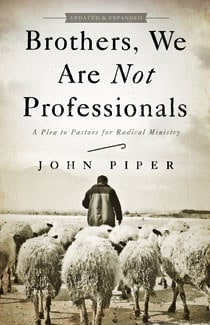 We recently connected with John Piper to talk about his new book, Brothers, We Are Not Professionals. In the interview we talk about personal growth, discipleship, exercising and several other interesting topics.
We recently connected with John Piper to talk about his new book, Brothers, We Are Not Professionals. In the interview we talk about personal growth, discipleship, exercising and several other interesting topics.
Tony: In the book, you spent a great deal of time challenging pastors to find time to read. What are three books that have been pivotal to your personal growth as a leader?
John: Jonathan Edwards’s The End for Which God Created the World set the course of my ministry 40 years ago. It gave the true north to my compass, and I have never doubted it since, even if I have imperfectly lived it. Daniel Fuller’s Hermeutics Syllabus in my freshman year at Fuller Seminary (1968) gave me a method and a passion for careful exegesis that has borne inexhaustible fruit for my soul and my preaching and writing. E. D. Hirsch’s Validity in Interpretation solidified in an unshakeable way my sense that the way I would like to be treated as an author is for someone to read what I wrote with a assiduous attentiveness to what I really mean to communicate. In other words, the central goal of reading is to think an author’s thoughts after him. It has cost great labor, and yielded great fruit.
Tony: Do you think today’s modern church is doing a good job of forming disciples? How can a church find a healthy balance between evangelism and discipleship?
John: There simply is no identifiable “today’s modern church” to assess. And if there were, I don’t get around enough to know how they are doing. But anecdotally I am encouraged with the little world I circulate in that very few of the leaders are unaware of the challenges of evangelism and subsequent disciple-building. It seems to me that there is much good being preached and written in both of these and how they relate. But I am aware that I swim in a very small pond. And out there in the big ocean of evangelicalism things may not be so good.
Tony: In chapter 27, you shared your current exercise routine of jogging and lifting weights. Many of our readers are young pastors who are fighting against busy schedules and deadlines. How have you been able to consistently exercise for so many years?
John: It helps if you hate being overweight more than you hate getting up early in the morning. I do. It also helps if you learn from experience that your holiness (like patience and hope) get a jolt from what happens in the mind and body by hammering “brother ass” (as C. S. Lewis called our beloved bodies) three times a week. It also helps to realize I sleep better when I exercise. In general, exercise pays. I am Christian hedonist, not an ascetic, which means I do self-denial for big returns, not for itself. I think Jesus taught it that way.
Tony: Our goal is to help leaders get “unstuck.” How would Brothers, We Are Not Professionals help a pastor who is currently struggling through a big ministry challenge?
John: It might not. That’s why I am glad God has an army of helpers. Another book might be exactly what he needs, not mine. But then again, it might help. One way is that the book is not meant to be read cover to cover in a logical flow. These are self-standing chapters. So a challenged pastor may simply flip through the Contents and spot one or two short chapters that he can read in a sitting and get some God-appoint
Tony: You wrote about being a “Bible-oriented” preacher rather than having an “Entertainment-oriented” approach. How do you feel about churches that use technology and media to present a “Bible-oriented” message in a clear and applicable way?
John: Since the use of media ranges from minimal to maximal, it is impossible to say how I would feel about any given use. So the most helpful thing to say might be that I believe preaching is the expository exultation of a Bible-saturated, God-centered, Spirit-filled man who is so moved by the treasure of his text that no media additions are needed to illumine the minds and enflame the hearts of his people. And he will, in general, feel that resorting to the use of media in preaching shows a lamentable loss of confidence in the power of the preached word, and will set the people on a trajectory of needing more and more media stimulation that is, in the end, unfulfillable.







Leave a Reply